Jaime Lissavetzky: President of the Spanish National Sports Council and Secretary of State in the Spanish governmentMISCELLANEOUS
Mr. Jaime Lissavetzky Díez was born in Madrid, Spain in 1951.
SHe took his doctorate in chemical science at the Complutense University of Madrid in 1977 and worked from 1977 to 1979 as assistant professor of organic chemistry at the University of Alcalá de Henares, where he was Secretary of the Faculty of Pharmacy. From 1979 onwards, he was tenured as Professor of Science in the Institute of Medical Chemistry, part of the Spanish National Research Council.
His work as a specialist in organic and pharmaceutical chemistry has resulted in numerous publications and he has acted as Director for various degree and doctoral theses.
In the political sphere, he started his career as Director of Education, Culture and Sport for the Community of Madrid from 1985 to 1995. Highlights of his term of management include:
- Establishment of the Carlos III University of Madrid in 1989.
- Establishment of the Ramón Carande University Center in 1990.
- Adoption of the First and Second Regional R+D (Research and Development) Plans for the Community of Madrid in 1990 and 1994.
- Formation of the Madrid Training Institute (Instituto Madrileño para la Formación (IMAF)) in 1991.
- Operational launch of the Cinema Academy of the Community of Madrid in 1993.
- Establishment of La Abadía Theater Center in 1994.
- Construction of the Olympic Stadium of the Community of Madrid (La Peineta), inaugurated in 1994.
- Launch of the City of Arts and Literature in 1995.
For his work in connection with his responsibilities for the area of education and sport, he was awarded the Gold Medal of the Royal Order of Sporting Merit and the Medal of Honor of the Complutense University of Madrid.
He was Secretary-General of the Madrid Socialist Federation from May 1994 until November 2000, spokesman for the Socialist Parliamentary Group in the Madrid Assembly from 1995 to 2000, and Senator (Madrid Assembly) during the sixth legislative term (1996-2000).
He was Member of Parliament for Madrid in the seventh legislative session (2000-2004), acting as second vice-chairman of the Science and Technology Committee; he was re-elected as Member of Parliament for Madrid in the election on 14 March 2004.
He is currently President of the Spanish National Sports Council (as from 20 April 2004) and Secretary of State in the Spanish government.
His current term of office has seen the adoption of the Organic Law on Health Protection and Combating Doping in Sport, and the Law against Violence, Racism, Xenophobia and Intolerance in Sport.
From 2004 to 2007, he also chaired the Iberoamerican Sports Council (C.I.D.), an organization that includes 22 countries.
He was recently elected to the post of Vice-President of the Conference of Member States of the UNESCO International Convention against Doping in Sport.
He was re-elected as President of the Spanish National Sports Council (as from 20 April 2004) and Secretary of State in the Spanish government on 14 April 2008.
In 2008, he was elected as a member of the Executive Committee of the World Anti-Doping Agency (WADA), as the sole representative of the European government in this organization. He was re-elected in 2010.
“An investment in sport is a secure and growing value asset” Mr. Jaime Lissavetzky is a chemist who worked as a teacher and researcher before entering the world of politics and government, where he set about an endless mission: facilitating creativity. His contributions range from new universities to initiatives aimed at promoting all the arts, sciences and -his main interest in recent years- sport. As an active participant in the fight against violence and doping in sport, Mr. Lissavetzky was one of the many who were delighted by Spain’s latest sporting victories, with the Football World Cup in South Africa as an unforgettable highlight among many others. Now he is tackling a new political challenge with the same positive and tireless attitude.
Your career in regional and national government
started a long time ago. In 1985, you
were a member of Mr. Joaquín Leguina’s government
in the Community of Madrid, as Director
of Education, Culture and Sport. In your
view, when did the turnaround take place in
the Spanish sporting world? When did Spain
start to assume a prominent global position?
There is no doubt that the 1992 Olympic Games
in Barcelona, where Spain won 22 medals, generated
crucial impetus for Spanish sport. The
Games coincided with the launch of the plan of
the Spanish Olympic Sport Association (ADO),
which marked a turning-point. From then on,
this country began to take sport seriously and
to promote talent. Our sportspeople began to
compete without complexes and our society
viewed sport as an instrument of change and
modernization, a window through which we
could project our new image to the world.
Do you think Spaniards are interested in
sport? As some analysts have said, is our
country living through a golden age of
sport?
I think that one of the aspects that must be
strongly emphasized when seeking reasons
for the success of our sportspeople is the increasing
importance that the Spanish public
attaches to sport. The affinity and the bond
that have been established between sport
and society are becoming much deeper as
time goes on. Sports broadcasts attract larger
audiences than any others and at every
championship, Spanish sports competitors
feel the great fondness in which they are
held. One example is the “spirit of the Reds”
that swept through the entire country, uniting
everyone through a shared feeling at
the Spanish squad’s victory in the last World
Cup in South Africa.
It is essential to provide support for young people in sport with the basic aim of ensuring continuity
What part do good sports results play in projecting
a positive image of the country?
Our sport has become our best window on the
outside world. Nowadays, Spain is an international
benchmark for every kind of sporting
activity, and its proven efficiency and organizational
capability for hosting major competitions
is an excellent way of showcasing our
modern and open society.
Which measures are being implemented by
your organization to ensure that we continue
achieving good results? Are centers of excellence
part of this strategy?
In recent years, we have made enormous
efforts to build new centers of excellence as
well as sports technology centers, with the aim
of adding new technologies and equipment to
those already in use. Moreover, we have encouraged
scientific and medical research and
backup to protect our sportspeople’s health.
We know that it is a complex matter to ensure
continuity in the results we are achieving, but
this goal can be fulfilled. To reach it is difficult,
and to maintain the attained level is even harder
– but this is the challenge posed by our
sporting endeavors.
The Spanish team was able to win the championship by playing football based on the talents of a generation of footballers who are not burdened by any complexes
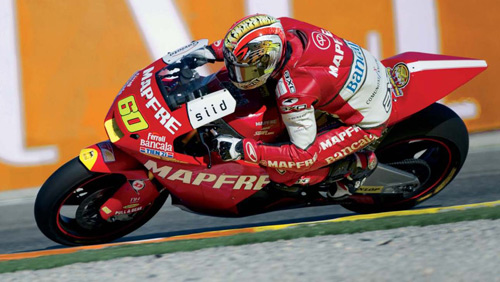
Julián Simón, racing driver of Aspar Team (world finalist in Moto2, 2010)
What budget is the Secretariat of State for
Sport expecting? And how will the main components
be used?
The planned budget for the 2011 financial year
will increase to EUR 166.7 million. Spain’s sporting
federations, the Spanish Olympic Committee
and the Paralympics Committee will receive
a share of EUR 80.8 million, with an additional
EUR 17.8 million generated by the private initiatives
in connection with the ADO and ADO
(Paralympics) plans. Subventions intended for
various administrative bodies to build and equip
sporting infrastructure installations will reach
EUR 5 million. The State Anti-Doping Agency
will receive EUR 5.2 million and other allocations
will be maintained, such as those for the sports tuition plan (EUR 600,000), the “Women
and Sport” policies (EUR 400,000) and for efforts
to combat violence in sport (EUR 200,000). To
be precise, this budget has been reduced by
7.98% as compared to its predecessor, but this
is in keeping with current austerity and correction
criteria, and the reduction also reflects the
completion of some major infrastructure projects
that were launched in prior financial years.
Is there a “before” and “after” for Spain following
its victory in the Football World Cup?
Has this triumph increased the reliability of
the “Spain” brand?
Attaining victory in the Football World Cup in
South Africa was a historic challenge for our
country – not only because we won, but also
because of how we won. The Spanish team was
able to win the championship by playing football
based on the talents of a generation of footballers
who are not burdened by any complexes.
Their “ordinariness”, their ardor for conquest,
their team spirit and their capacity for sacrifice
have projected an image to the world of a country
that knows how to deal with adversity.
There is no doubt that insurance companies offer essential legal and medical cover for our sportspeople
There is a whole list of sporting disciplines
where Spain is significant: football, basketball,
handball, cycling, tennis, motor
sports, sailing, certain athletic disciplines
and so on. In which other areas should we
have a presence and make rapid progress?
What is being done and how?
We should savour this moment and appreciate
it because the worst thing we could do is to let
ourselves be lulled into complacency. We should
carry on working to maintain the levels we have
achieved in certain disciplines and to improve
our results in others. Neither of these are easy
challenges but the path is already staked out.
For this purpose, the Spanish National Sports
Council is working side by side with the sports
federations to make all the resources available
to us.
What support is being given to our promising
young talents? And the others that want to
take Spanish nationality?
I think it is essential to provide support for
sport with the basic aim of ensuring continuity.
For this purpose, among other measures,
the Spanish National Sports Council has
rolled out the National Program to Promote
and Assist Sport in Schools (PROADES) and
the National Program to Assist Sports Participants
in Schools (ADE) in recent years.
The objective is to encourage participation
in sports by young students and pupils, without
neglecting their overall education, with
the help of subventions through the Autonomous
Communities and the specific sports
federations. Moreover, last October 14th, we
signed a cooperation agreement with the Ministry
of Education to launch a national plan
that will encourage physical exercise and
sporting activities for young people throughout
their period of schooling. As regards
policy on naturalization: I think that for such
cases, objective criteria have always been
taken into account and the interests of the
sportspeople themselves have always been
protected and respected. Apart from very exceptional
cases, our policy has always been
to aim for integration and due recognition of
immigrants’ rights in the context of Spanish
sport.
What is the relationship between insurance
and sport? Where are they complementary or
indispensable to one another? How can the
insurance sector cooperate?
There is no doubt that insurance companies
offer essential legal and medical cover for
our sportspeople. They provide the necessary
peace of mind so that the athletes can devote
themselves to their mission, knowing that they
have guarantees. In this regard, I think it is fair
to thank the insurance companies for supporting
Spanish sports and sportspeople.
In your opinion, which sporting activities are
best suited to sponsorship from insurance
companies?
I believe that any sporting discipline can be
appropriate for sponsorship offered by insurers.
The values that sport enshrines and that
are conveyed in exemplary fashion by our leading
athletes, are the best way of securing a
profitable identity in the business world. The
value of sport is growing nowadays, and an
investment in sport is a secure asset.
The issue of doping is usually linked to sport
and there is an international consensus that it
should be combated. Which control measures
have been implemented in Spain over recent
years?
Doping is a global problem, and one that requires
everyone to be involved if it is to be
progressively eradicated. Since I became
President of the Spanish National Sports
Council, I have shown my firm commitment
to implementing the “zero tolerance” principle
with regard to doping. The Organic Law
on Health Protection and Combating Doping
in Sport came into force in 2006, after
passing through parliament with very broad
support and extensive backing from society
as a whole. Prominent among the measures
it envisaged was the formation of the State
Anti-Doping Agency, which began operating
in 2008 with the objective of encouraging policies
of prevention, awareness-raising, research
and collaboration at the institutional
level. Spain currently has two doping control
laboratories that are approved by the World
Anti-Doping Agency (WADA) and are equipped
with the most advanced facilities in the
field. Furthermore, our commitment has met
with international recognition in the form of
my recent re-election as a member of the
Executive Committee of WADA, and in fact,
I am the sole representative of the European
governments on that body.
We should savour this moment and appreciate it, but the worst thing we could do is to let ourselves be lulled into complacency
If you become Mayor of Madrid, what will you
do to promote sport in the capital? Will the
city make more attempts to be selected to
host the Olympics?
One of my main goals will be to work in order
to increase the level of participation in
sport by the people of Madrid, with the aims
of improving their health and preventing medical
problems related to a sedentary life. To
achieve this, we shall encourage measures
that can instill healthy living habits linked to
sport. Regarding the idea of launching a new
bid to host the Olympics in Madrid: I think that
this has to be a well-considered decision, based
on consensus and level-headed research,
and we must take account of the circumstances
at the time. For example, it will be necessary
to analyze the suitability of a candidacy
and our potential rivals. But what is clear is
that the city of Madrid is ready to make its
Olympic dream come true, and it deserves to
host the games.
 ADO (Spanish Olympic Sport Association)
ADO (Spanish Olympic Sport Association)
ADO is a program to support “high-performance Olympic sport” with the principal aim of improving
the results of Spanish competitors in the Olympic Games, underpinned by the key characteristics
of demanding criteria and the pursuit of sporting excellence.
http://www.csd.gob.es
 PROADES (National Program to Promote and Assist Sport in Schools)
PROADES (National Program to Promote and Assist Sport in Schools)
This program is based on a three-pronged approach: subsidies to the Autonomous Communities
to finance programs within their scope, support for the Spanish Sports Federations
for events that they stage, and the organization of the annual ADE scholarships (see
below).
http://www.csd.gob.es/csd/competicion/05deporteescolar/programa-nacional-de-promociony-ayuda-al-deporte-escolar-201cjuega-en-el-cole201d-proades
 ADE (National Program to Promote and Assist Sport in Schools)
ADE (National Program to Promote and Assist Sport in Schools)
The program’s goal is to promote and encourage practical participation in sports among students
who – either individually or in groups – qualify to compete in any of the specialist disciplines
in the Spanish School-age Championships staged by the Spanish National Sports Council,
with equal importance accorded to sporting and academic performance.
 WADA (World Anti-Doping Agency)
WADA (World Anti-Doping Agency)
The World Anti-Doping Agency (WADA) is an independent international organization established
in 1999 to promote, coordinate and monitor the fight against doping in sport in all its forms. The
sports movement and the world’s governments constitute and finance the Agency on a basis
of parity. WADA works to realize the vision of a world that appreciates and encourages sport
without doping.
http://www.wada-ama.org/
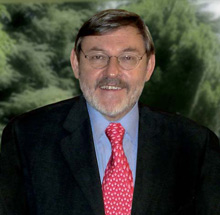

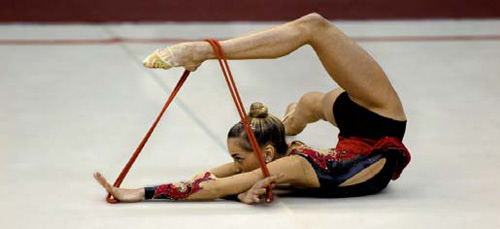
Julia Usón, gymnast
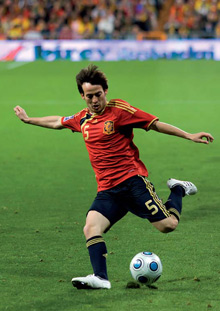
David Silva, Spanish national football team (world champion, 2010)
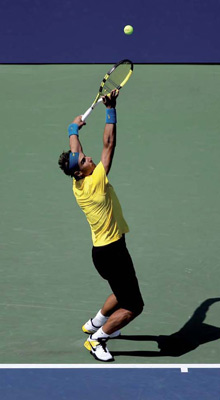
Rafa Nadal (current number one in ATP ranking)
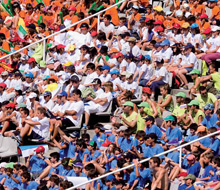 Spectators in European Championship of Athletics, Barcelona 2010
Spectators in European Championship of Athletics, Barcelona 2010 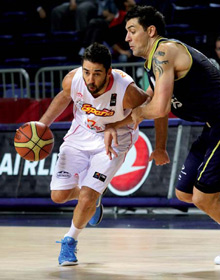 Juan Carlos Navarro, Spanish national basketball team (Europe Champion 2009)
Juan Carlos Navarro, Spanish national basketball team (Europe Champion 2009)
